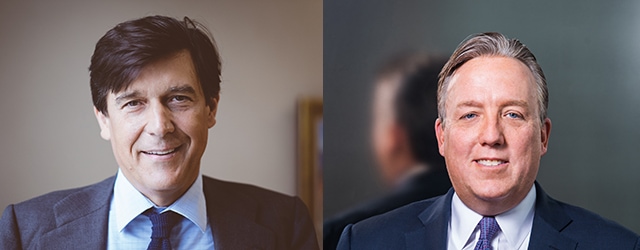Citi executives sit down with Global Finance to discuss the uncertainties of Brexit, the US-China trade war, and changing M&A patterns.
 Manolo Falco (l) andTyler Dickson (r), co-heads of Citi’s banking, capital markets, and advisory group. |
As the first anniversary nears of their appointment as co-heads of Citi’s newly merged banking, capital markets and advisory group, Tyler Dickson and Manolo Falco see significant growth opportunities in the markets, despite a difficult environment, and are confident of meeting their medium-term goal of making Citi a top three investment bank globally across the debt and equity capital markets, as well as in mergers and acquisitions.
“We are the only truly global universal bank with a highly competitive corporate and investment banking franchise,” Dickson says. “Our corporate and investment banking teams have been integrated for more than a decade, so have our capital markets teams and we are uniting them further.”
Dickson says the new structure will enable Citi to understand clients’ needs better and to create a stronger dynamic with regards to a united culture at the bank. Citi is active in more than 160 countries, with an office on the ground in 98 of them.
“Our global reach enables us to be more responsive and more anticipatory,” Dickson says. “We have strong, longstanding relationships with our clients. Citi’s stability, insights and advice, breadth and depth of products and services make us relevant with boards, CEOs, CFOs and treasurers.”
Dickson is based in New York and Falco in London. They have a combined 50 years of experience at Citi. Both sat down with Global Finance editor Andrea Fiano and senior writer Gordon Platt at the bank’s headquarters in New York to discuss how they are deploying talent to maximize the bank’s capabilities and grow its share of wallet among clients, including large multinational companies and sovereigns. The bank is among the top in the world with public sector clients and has identified investing in infrastructure as a major global trend.
“Infrastructure-related banking activity is expected to grow based on the world’s ever-expanding needs,” Dickson says. “When we think about infrastructure, we are thinking about more than bridges and tunnels. We are looking at how technology and mobility are augmenting smart cities of the future.”
Under Dickson and Falco’s leadership, the investment bank has created a cross-sector internal “think tank” of bankers partnered with Citi Ventures to support and advise clients.
Markets have become more volatile with the US-China trade war, Brexit uncertainties and geopolitical risks, the Citi bankers say. “The global economy is becoming fragmented and growth will be slower,” Falco says. “M&A patterns are changing. There is more intra-country/regional M&A, such as Aramco’s acquisition of Sabic in Saudi Arabia.”
It is also taking longer for deals to be approved because of changing regulations, Falco says. Cross-border Chinese M&A is much lower than in recent years, Falco says, and the European Commission earlier this year blocked the proposed merger of Siemens Mobility and Alstom due to competition concerns.
“The world is becoming more complicated,” Falco says. “China is trying to develop its own economic areas of influence. Meanwhile, because of Brexit, a new strategy has to be created for the UK and the rest of Europe.”
Notwithstanding the challenging global environment, Citi’s investment bankers remain busy. “We have a solid pipeline of opportunities in all geographies,” Dickson says. “With debt-financing rates lower for longer, there has been more debt issuance. We see targeted opportunities to grow revenue and increase market share.”
Transformation and disruption from technology are creating opportunities in M&A, debt and equity, he says. “There are macro trends that will drive activity—new ecosystems are emerging around disruption, sustainable finance, infrastructure, mobility and wellness, which require us to serve our clients differently. Financial sponsors have a lot of capital and private market capital pools are large and growing,” Dickson says. “We like the outlook for the US market and economic growth. This economic cycle could extend for a period of time. We have a home-court advantage.”
Dickson also likes growth opportunities in China (“where we have been for 100 years”), as well as in Brazil and the Middle East, particularly Saudi Arabia, which is introducing sweeping reforms to modernize its economy under its Vision 2030 program.
“Even with bouts of volatility, we still have broad growth in many emerging markets,” Dickson says. “With low interest rates, investors are forced to reach for yield.”
Citi is already firmly ensconced in the top three investment banks in the debt capital markets, where it ranked second to J.P. Morgan in the first seven months of 2019. “We are improving our share in M&A and equity,” Dickson says. “We are adding talent and resources selectively in key priority areas. We have developed great internal talent that is here and ready to lead. Given the environment, we are growing carefully. We are not increasing overall head count materially and we are making sure we are managing exposure and risk prudently,” he says.



